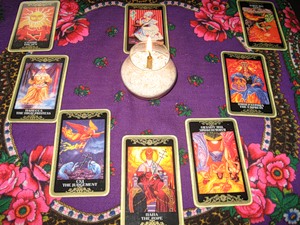Your questions need to be precise in order to recieve accurate answers. The question needs to be clearly defined; otherwise you may confuse or even hurt. The tarot spread you are performing depends on which questions need to be asked.
Ask One Question at a Time
The question needs to be simple. For example, the question “Will I have a good time on my holiday, and will I meet someone during the holiday?” should be divided into two separate questions:
“Will I have a good time on my holiday?”
and
“Will I meet someone during my holiday?”
Each of these questions needs a spread of its own (2 spreads in total). You can have a good time on your holiday, but at the same time you might not meet anyone – or the other way around.
Another thing to note in the second question is the “someone” part. It’s too general, and for better and accurate results, the following question is preferred:
“Will I meet a man during my holiday?” (if a woman asks the question)
Note that this doesn’t relate to “or” questions.
Yes/No Questions
A simple rule for questions: formulate your questions in a way for them to be answered by a simple “yes” or “no” answers. For example:
“When will I get married?” – incorrect.
“Will I get married?” – correct.
Question’s Purpose
The question needs to have a purpose or a reason for it being asked. With a question like “Will I meet someone during my holiday?” the purpose is clear. But questions like “Should I change my job?” – change your job for what? There could be different reasons for this: For higher salary, for a friendlier workplace, for pursuing your career and so on. So instead, the formulation of such question should be:
“Should I change my job in order to get a better salary?”
In such a case, it can be assumed that you already found a new job, and what’s left is to decide what to do.
Question Options
“Where will I receive better pay: the old job or the new one?”
For such questions, a special tarot card spread is needed in order to weight and compare the various options that are asked in the question, and choose the best one of them.
Positive Questions
Try to turn the negative questions into positive ones:
“How do I get him back?”
can turn into
“Should I get him back?”
“What will bother me?”
can turn into
“What will help me?”
Defining Time Period
It is also a good practice to specify a certain period of time when asking questions regarding the future. If a time period is not given, the question spans the entire life and thus making the answer generalized and subject to the many different changes a person goes through in his life.

